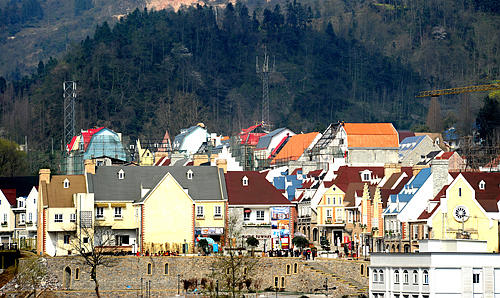|
 |
|
(CFP) |
With French-style cobblestone streets, an eclectic mix of buildings and architecture, and the overall relaxing atmosphere, it's easy to get swept away by the fairy-tale-like experience of Bailu Town in Sichuan Province. The town, two hours away from the provincial capital Chengdu, is a cultural gem rarely seen in China's hinterland.
Architectural marvels aside, Bailu uses its natural environs to its advantage. Tucked away in the rugged Longmen Mountains and straddling nearby waterways, it has a rich cultural heritage, with a long history of Buddhist and Taoist tradition. The town has also been influenced by French culture, after French missionaries built bridges, churches and schools there in the late Qing Dynasty (1644-1911).
The 8.0-magnitude quake that struck Sichuan Province on May 12, 2008 killed 68 people in Bailu. Almost 20,000 houses were leveled or severely damaged.
Brilliance renewed
The local government wasted no time rebuilding lost structures, especially those of historical significance. The State Administration of Cultural Heritage also allocated 41.5 million yuan ($6.40 million) to the project, which will be completed in 2012.
"The historic relics are critical in our plan to attract visitors to a new Bailu," Liu Hanjun, a township official, told Beijing Review.
Progress in preserving the town's rich history is highlighted in the reconstruction of a Catholic Church. The original building bricks and wood were reused in the reconstruction process to preserve the building's unique flavor.
Ruins from the quake are prevalent even after three years of reconstruction. Stone statues of a teacher protecting two students, as well as many students being evacuated from the school, stand near the original school building, its cracked walls and shattered glass windows let to stand as a testament to the disaster. An earthquake experience hall, which incorporates an earthquake simulator and an authentic video to provide visitors with immersive earthquake experience, is still under construction nearby.
Now, the local government and residents of Bailu have put the past behind them as they look to a future of prosperity.
During the early stages of reconstruction, government officials considered a variety of designs to give Bailu a new look. Parties involved in the planning finally agreed on utilizing Bailu's rich natural and historical resources to provide renewed life to the area. The Longmen Mountains Geological Park would be incorporated into a new Bailu, as would a brand new French-style town to add a touch of European charm to the vicinity.
French connection
Along Bailu's French-themed streets, modeled after the original setup that took shape after Frenchmen arrived more than 300 years ago, Chinese roses add color to the second-story windows of most buildings. The crash of mahjong bricks fills the air.
Under the yellow, gray or blue roofs, operators of bakeries, bars, Internet cafés, florists and wedding photography studios are busy adding the finishing touches to their facilities. A franchise motel has also been open for business. Luring aromas fill the air from a nearby inn that specialized in Bull Mountain coffee and lavender tea.
The authenticity of Bailu's French touch was confirmed by cultural connoisseurs. On May 6, Gerard Deleens, Chairman of the China Council of French Foreign Trade Advisors, accompanied by French Consul General in Chengdu, Emmanuel Rousscau, and a dozen French visitors, visited a clinic and a drinking water facility the council donated to the town.
The Sichuan people have demonstrated great courage after the quake, and are standing on their feet again, said Rousscau. "We were all witness to this."
Deleens said he expects the town to become a step for further Sino-French friendship and cooperation.
Bailu has also signed an agreement with the International Student School of Sichuan University on acting as a base for cultural activities for French students in Chengdu.
Challenges
Historically, the town has relied on mining as a major growth stimulus. Although a source of jobs, the mining industry had a largely negative impact on the area. For a time, pollution endangered the lands surrounding Bailu. By the end of 2006, most mines had shut down, which solved one problem but created another: an employment deficit. With nowhere to work, the region's youth left for coastal cities. Today, Bailu hopes to draw some of those young people back and keep its current generation of young, ambitious workers from leaving through developing tourism.
Already, tourist attractions are springing up. A sightseeing area along the town's riverbank, a viewing platform of the surrounding environs, ancient pagodas, modern plazas and gingko trees, in addition to the French-style street, will entice tourists looking for a quiet, yet exciting, getaway. Along the Bailu Valley, exotic plants will be planted. Agri-tourism is also on the locals' minds.
Most post-quake towns in Sichuan have adopted a recovery strategy similar to Bailu's, focusing on boosting tourism and having made great efforts to promote their ancient or ethnic styles. "But Bailu is unique. It stands out," said Liu.
The new French-style street was inaugurated on May 12. But the gaggling of flocks of tourists is nowhere to be heard. Many facilities still need perfecting. The Chinese roses need watering.
"This is only the beginning of a new chapter for Bailu," said Liu.
The local people, though obviously experienced in Chinese culture, are new in to hospitality business, especially one embracing a foreign culture and trends. Given time, training and practice they will eventually realize their French dream. "I have confidence, we all have confidence," said Liu. | 